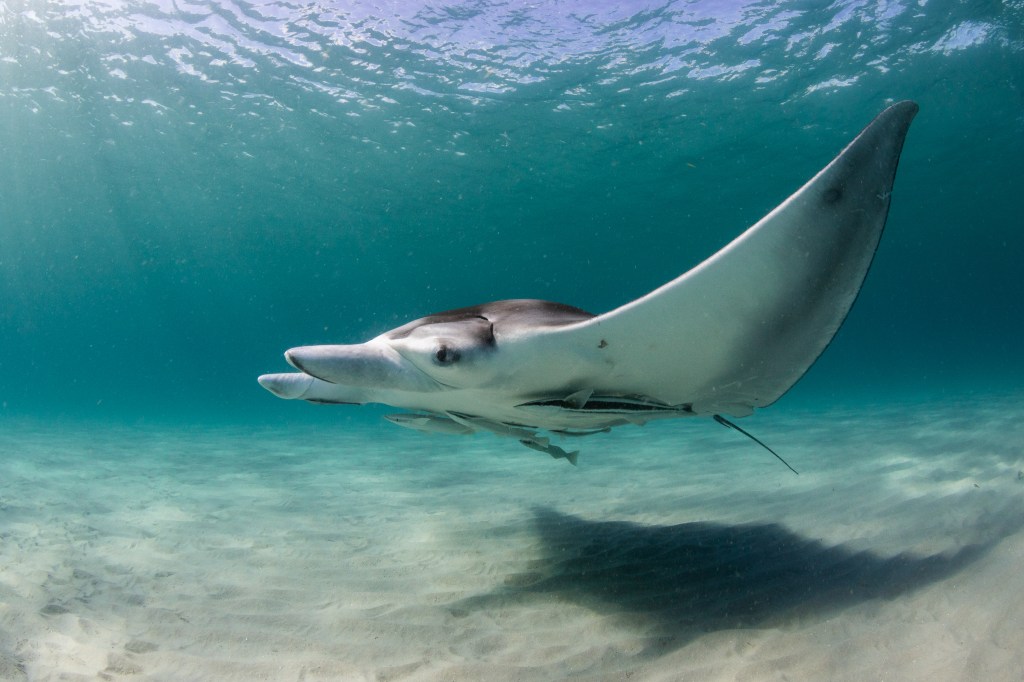Florida’s wildlife agency has temporarily suspended licenses that allow aquariums to capture threatened sharks and rays as it weighs permanent changes to its rules, according to a letter made public Friday.
The action follows the controversial capture of a giant manta ray for SeaWorld Abu Dhabi in July near Panama City Beach that outraged some Floridians and sparked concerns from a bipartisan group of state and federal lawmakers.
“We understand both your concerns and those raised by the public following the recent harvest of a giant manta ray,” Rodney Barreto, the chairman of the Florida Fish and Wildlife Conservation Commission, wrote in his response to lawmakers.
The agency stopped issuing new licenses on Aug. 19 for the collection of sharks and rays listed under the Endangered Species Act, he wrote. A formal rulemaking process will start early next year to provide “more permanent solutions,” he added.
Florida is the only state that allows marine parks to take the manta ray, sometimes called the “angel of the sea,” from its wild habitat for exhibition, according to a 2024 federal report.
The July capture was caught on video and went viral on social media. It showed a crew hoisting a manta ray out of the sea and lowering it into a pool on their boat deck. State wildlife officials said the capture was legal through a special license issued to SeaWorld Abu Dhabi and Dynasty Marine Associates, a Florida Keys-based aquarium supplier.
Florida allowed capture of threatened giant manta ray for overseas aquarium
But the dolphin tour boat operator who witnessed the capture and whose crew member filmed it, said he was angry that a threatened species could be plucked from Florida’s waters. Many who watched the video agreed.
Additional records obtained by the Orlando Sentinel revealed Dynasty Marine collected two other manta rays in 2023 for SeaWorld Abu Dhabi, including one that died after its health declined in a Florida Keys holding tank before it could be shipped overseas.
In a joint letter, members of Congress, the Florida House and the Florida Senate wrote that “authorizing the removal of a threatened marine species for foreign display represents a significant departure from the values and principles that have traditionally guided FWC and Florida’s wildlife policy.”
The letter was signed by U.S. Rep. Brian Mast, a Stuart Republican, along with state Reps. Lindsay Cross, D-St. Petersburg, Peggy Gossett-Seidman, R-Highland Beach, and Meg Weinberger, R-Palm Beach Gardens. Democrat-turned-independent state Sen. Jason Pizzo added his support as well.
Cross said she appreciated the response from wildlife officials, but she’d like more prompt action on permanent changes. She added that she still has unanswered questions about the approval process for the special licenses.
“I am glad to see interest in this,” she said. “We are going to try to keep this in the public eye. We don’t know the fate of the current manta ray that was captured. If there is anything we can do to prevent it from living the rest of its life in captivity, we’d like to see that happen.”
SeaWorld Abu Dhabi has not responded to several requests for comment on the fate of that animal.
FWC’s authorization to capture threatened ray and shark species has been removed from five previously issued licenses, Barreto wrote.
SeaWorld Abu Dhabi was only authorized to collect one manta ray this year, so no additional ones will be collected, he added.
Daniel Ashe, president and CEO of the Association of Zoos and Aquariums, said Florida’s licensing program is highly regulated and allows marine life to be collected for research and to educate the public about the need for conservation. The most significant threats to manta rays are boat strikes, fishing nets, illegal hunting and climate change, he said.
“This very tiny harvest of animals for public display … is sustainable,” he said. “In no way is it contributing to the decline of these populations in nature, and it provides us with invaluable opportunities to learn about them.”
Just a handful of aquariums in the world display the manta ray. Ashe said he sees value in allowing the species to be exported.
“It’s an opportunity for the people of Florida to speak to the rest of the world and give the rest of the world the opportunity to see the majesty of these animals and help conserve them,” he said.
FWC agreed that showcasing the state’s marine life can be beneficial, writing in its letter that accredited aquariums “play a vital role in conservation efforts” and that those animals become “ambassadors for their species.” But the agency wants to make sure that granting licenses for their capture does not “negatively impact Florida’s living marine resources.”
Jessica Pate, founder of the Florida Manta Project, said she thinks manta rays are not well-suited to captivity because of their intelligence and migratory patterns. With a wingspan up to 26 feet, the animal can grow to 5,300 pounds, about as much as a car.
Florida wildlife officials have granted licenses in recent years to capture a manta ray to the Nausicaá Centre National de la Mer in France, Chongqing Andover Ocean Park in China and another facility in the United Arab Emirates, The National Aquarium Abu Dhabi, according to records obtained by the Orlando Sentinel.
So far, none of those aquariums have obtained manta rays under the licenses issued over the past five years, wildlife officials said. Now, they will not be allowed to keep searching for one.
The Georgia Aquarium, the only U.S. aquarium to showcase the manta ray, received a license, too, but a spokesman said it has no plans to acquire another manta ray.
Two of the three manta rays on display in a 6.3 million-gallon habitat at the Atlanta facility were taken from Florida waters about 15 years ago, according to the aquarium.
Originally Published: September 5, 2025 at 6:21 PM EDT

